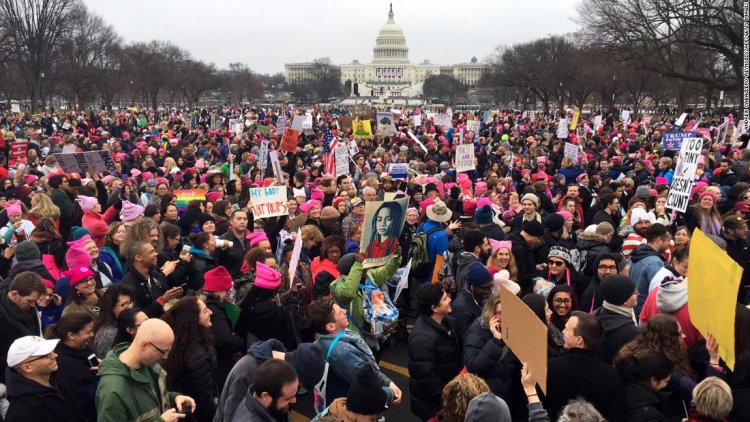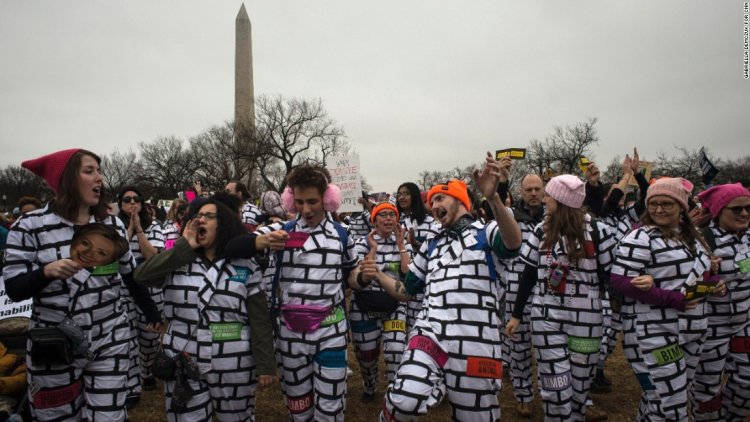 Protesters gather on the National Mall near the US Capitol. |
Hundreds of thousands of people marched through Washington, D.C., and cities around the world Saturday to show support for women's rights and anger over the election of President Donald Trump.
The Women's March drew members of Congress, world-famous actresses and countless citizens like Joanne Gascoyne of Albany, New York, a 78-year-old retired teacher who traveled to New York City with her daughter and two granddaughters.
"I feel people are afraid to vote for a woman for president," Gascoyne said. "I'm really here for women and to inspire my granddaughters to carry on."
The protesters came out for a range of reasons, including immigration, health care and a general antipathy to Trump. But most said they wanted to show support for women and feared that there will be attacks on women's rights during Trump's presidency.
The biggest demonstration took place in Washington, where protesters filled Pennsylvania Avenue, the same street Trump walked down a day before during his inaugural parade. In the evening, the crowd moved toward the White House.
On the mall, filmmaker Michael Moore, feminist icon Gloria Steinem, musician Alicia Keys and other speakers emotionally attacked Trump for his views on immigration, Muslims and women.
"It took this horrific moment of darkness to wake us the f--k up," Madonna told the crowd. "It seems as though we had all slipped into a false sense of comfort, that justice would prevail and that good would win in the end."
March organizers said protests took place in more than 600 cities across the world.
Attendance was not always easy to determine. For instance, Washington march organizers said about 500,000 people took part, but authorities did not confirm that number or provide their own estimate.
In Boston, 120,000 to 125,000 people protested, according to a police aerial photo analysis cited by a senior Boston Police official. Police said the crowd there was too big for the march route and could not proceed because "it would be like a snake eating its tail."
Sen. Elizabeth Warren urged Boston protesters to resist: "We can whimper. We can whine. Or we can fight back! We come here to stand shoulder to shoulder to make clear: We are here! We will not be silent! We will not play dead! We will fight for what we believe in!"
In Los Angeles, more than 100,000 people marched, police said. So many people crammed into the streets that "our march turned into a stand," said Ellen Crafts, who handled public relations for the event.
 Protesters gather on the National Mall near the US Capitol. |
 Demonstrations at the Women's March rally toward the White House on the National Mall. |
Demonstrators in New York City marched toward Trump Tower — the President's main residence when he's not in the White House — but were blocked at Fifth Avenue. Police said 20,000 people protested in Houston, 60,000 in Oakland.
Overall, the protesters were law-abiding. Atlanta police tweeted that 60,000 people participated and thanked the marchers for being "peaceful and without incident."
CNN could not independently confirm any of these crowd estimates.
"Sister marches" happened outside the United States, too.
People gathered to demonstrate in most major cities around the world, including London; Tel Aviv; Melbourne, Australia; Pristina, Kosovo; Moscow; Berlin and Mexico City — often in front of US embassies.
In Athens, Greece, protesters included refugees from Elliniko Camp, located in the old Athens airport.
There was even a protest in Antarctica — about 30 eco-minded tourists and non-government scientists aboard a ship in international waters hoisted signs saying "Penguins for peace" and "Seals for science," organizers said.
The march organizers believe more people came out Saturday for the protests than for Trump's inaugural events on Friday.
Washington protest organizers, who originally sought a permit for a gathering of 200,000, said Saturday that as many as a half million people participated, dwarfing Friday's inaugural crowd.
More than 470,000 people had taken the Metro, the Washington subway system, by 1 p.m., a weekend ridership record. The metro tweeted Saturday there were 275,000 trips taken Saturday by 11 a.m.